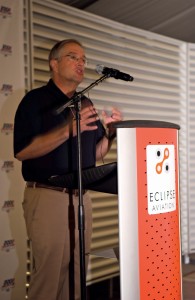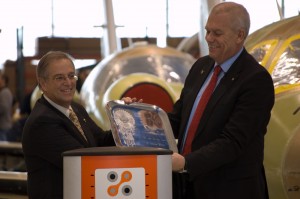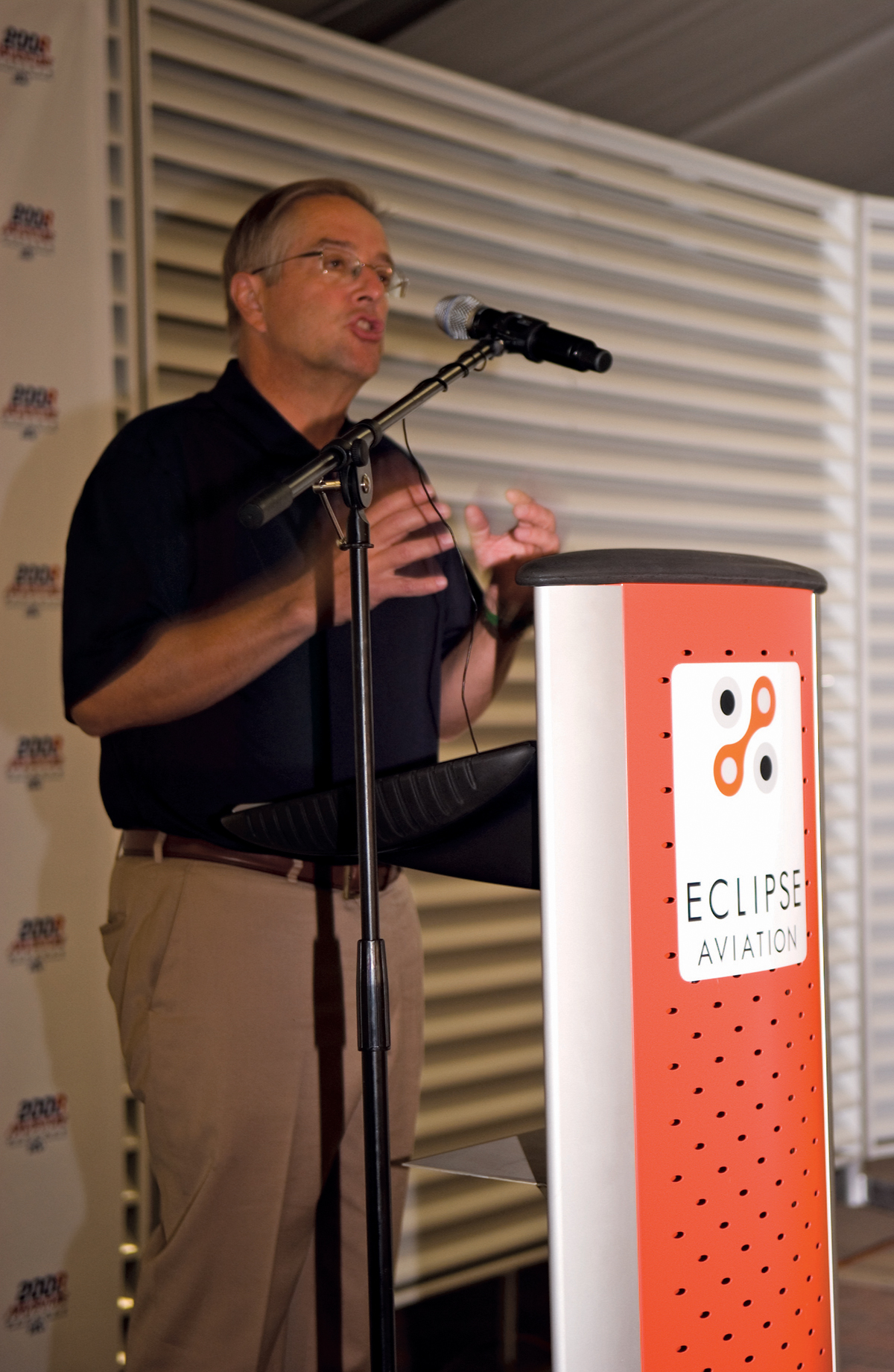
Vern Raburn announced at AirVenture that he was stepping down, after being asked to resign as CEO of Eclipse Aviation. He’s since refused a position as vice chairman with ETIRC, Eclipse’s largest shareholder & announced he’s cut all ties to both companies
By Karen Di Piazza
Roel Pieper, Eclipse chairman and founder and chairman of European Technology and Investment Research Center, has become CEO of Eclipse Aviation Corp., replacing Vern Raburn, who founded the company in 1998. On July 28, at the Experimental Aircraft Association’s AirVenture in Oshkosh, Wis., Eclipse’s news came as a shock for some.
Raburn agreed he’d accept a vice chairman position with Dutch-based ETIRC, Eclipse’s majority shareholder, in charge of marketing and sales in Europe and in Russia. Since the announcement, things have changed.
On Aug. 14, Raburn distributed an email saying he’s cutting all ties to Eclipse, manufacturer of the six-place Eclipse 500 very light jet. His email in part reads: “I announced my departure from Eclipse Aviation, a move that was required by the investors to pave the way for a new round of financing. After further consideration of this position (offered as vice chairman), I’ve decided not to accept it. I have no further relationship with Eclipse Aviation, either domestically or internationally.” He didn’t announce any new plans with another company.
Although Raburn told customers and investors early on that production levels on the E500 were likely to reach four a day, production hasn’t reached one aircraft a day. On July 28, Eclipse said it had delivered around 230 aircraft since it began deliveries on Jan. 4, 2007. The company has suffered serious setbacks; a revolving door of suppliers and numerous certification delays have plagued Eclipse for years.
In June, Eclipse began taking $100,000 deposits from its existing customer base for its four-place, single-engine E400 VLJ, after Raburn announced production plans and certification set for the fourth quarter of 2011. On July 1, Eclipse sent emails promoting its E400’s base price at $1.38 million, offering AirVenture attendees that put down a deposit “$30,000 in free upgrades.” Although Eclipse took deposits on the plane at AirVenture, according to an EAA article, Pieper announced during the event that the decision whether to produce the E400 wouldn’t be announced until November.
As of Aug. 8, Eclipse let 190 temporary workers go. The company stated it still employs nearly 1,865 people. Between this cut and the one in October 2007, 340 workers have been let go, some of which included permanent personnel. The reduction of Eclipse’s workforce doesn’t account for aircraft engineers, line inspectors, airframe and power plant mechanics and avionic technicians who’ve said they’ve resigned.
Customer deposits frozen as well as E500 modifications
After Eclipse announced in May that its E500’s base price would be $2.15 million, position holders began canceling orders and asking for their deposits back. Although
ETIRC invested more than $100 million in January, and a new round of undisclosed funding at AirVenture, refunds are frozen until the end of the year, per an Aug. 13 Aircraft Owners and Pilots Association report. The reason given for the delay of paying refunds is because Eclipse expects the next round of funding to close by year-end.
An Eclipse spokesperson confirmed to AOPA that of the Eclipse aircraft already delivered, it won’t be making any modifications to the VLJ, except to “attempt” installing modifications for flight into known icing. Also, it was confirmed that due to a “parts problem,” Eclipse’s second shift was shut down, but allegedly has reopened.
When Pieper announced at AirVenture that first funds in a new round of financing would make the company “cash flow positive,” position holders took that to mean they’d receive their refunds immediately. Following Pieper’s announcement, on July 31, Eclipse sent emails to customers who asked for refunds. It stated that a 6-percent, per annum simple interest, “accruing from the date Eclipse received your request for a refund,” would be added.
With customers growing restless over delayed refunds and aircraft owners being notified the company isn’t installing other modifications on the VLJ, such as updated avionics, rampant blog discussions speculate Eclipse will shut down its production plant in New Mexico and reopen one in Russia.
On Aug. 14, Eclipse issued a “media alert” denying that speculation. No media publication has stated that the company was shutting down its New Mexico plant; Eclipse’s denial seems to be aimed at blogs. However, Eclipse has stated it still plans to build a facility in Russia. The plane maker said it’s “evaluating every aspect” of its operation and would announce a “plan to profitability by the end of the month.” The company also said it won’t ” be releasing any further information or conducting interviews” at this time.
Refund lawsuits
In April, Indiana-based Gieger Excavating Inc. filed a lawsuit against Eclipse alleging the company unlawfully kept its $150,000 deposit and refused to refund the money. According to the plaintiff, prior to April 18, Geiger confirmed with the plane maker the anticipated delivery date “had been moved back to October/November.” The lawsuit further states: “Despite this, Eclipse refused to change the due date of the invoiced amount to be in compliance with the deposit agreement.”

Vern Raburn (left) appears with Roel Pieper in Jan. 14, 2008, after Eclipse announced ETIRC was making a $100 million equity investment in Eclipse, making it the company’s single largest shareholder.
In addition, the court document states that the deposit agreement “provides that Eclipse and Geiger will enter into a purchase agreement for the aircraft 180 days prior to delivery,” and “upon execution of the purchase agreement, Geiger must pay 60 percent of the final delivery price,” less its deposit amount. The suit states a provision allows for Geiger to cancel the deposit agreement and obtain a refund, “if the FAA Part 23 certification of the Eclipse 500 jet occurs after June 30, 2004.” Certification took place more than two years later.
On Aug. 5, Ice Blue Air Ltd., a British company, filed a lawsuit against Eclipse over its alleged refusal to refund the company’s deposit. The complaint filed is for breach of contract, unjust enrichment and conversion. IBAL said it entered into a deposit agreement in July 2006 for an E500 priced at $1,520,000, exclusive of optional equipment and economic escalation formulas.
Also on Aug. 5, Pieper held a conference call with its customers to address refunds and production of aircraft for the E500.
“I have $170,000 at risk; it’s been much longer than a month since I’ve asked for my refund on an E500,” said a customer who attended the conference call.
As the customer is deciding whether or not to file suit against Eclipse, he asked not to reveal his identity.
“One guy who has a deposit on an E500, serial number in the low 400s, and deposits for two E400s, asked, ‘Does Eclipse have enough money to make it through production of my aircraft?'” he said. “Pieper’s answer was no, unless the company can raise more money. He also admitted that the company is still selling, taking new deposits—yet we can’t get our money back. My deposit is on a much higher serial number, so you can appreciate how upset customers are.”
The customer added that position holders are worried about Pieper’s loyalty.
“Since ETIRC is an investor and now owns Eclipse, there’s concern it’ll favor its own interests—using position holders’ money to build a plant in Russia —rather than take care of existing Eclipse customers,” he said. “What we have here is a company that’s taking deposits, not refunding as required by contract and openly admitting there isn’t enough money to continue unless additional capital is obtained. I’m worried Eclipse will file bankruptcy; if so, I’m concerned, as are other customers, that I’ll become an unsecured creditor.”
Could Eclipse be headed for bankruptcy?
Richard Aboulafia, vice president, analysis, at Virginia-based Teal Group Corp., said there’s a growing chance of an Eclipse bankruptcy.
“The refusal to provide refunds is definitely not a good sign,” he said. “But this was a foolish, unrealistic and possibly deceptive business plan from the start. Investors, customers and true believers must have had an idea that events would transpire like this.”
Aboulafia said that moving forward, the new owners would definitely stand a better chance, if or when they write off all obligations.
“The fundamental problem that plagued the program from the start is that the price tag only made sense with completely crazy production numbers,” he said. “That equation worked OK as long as the believers threw cash into the fire. But as the cash injections slowed, the equation began to unravel. Now, in order to stand a chance of turning cash positive, the owners will need to raise the price further. If the price is close to the Mustang or the Phenom 100, the Eclipse 500 won’t look good at all.”
Although many people in and outside of the aviation industry have hailed Raburn as an innovator, Aboulafia has a different opinion.
“Blowing through more than $1 billion, denigrating all the established players, and setting up a completely unsustainable business plan isn’t an achievement of any kind,” he said. “There are many other words to describe what Raburn has done; innovation isn’t one of them.”
Bloggers, a thorn in Eclipse’s side
By Aug. 1, the highly publicized Eclipse Aviation Critic NG blog lawsuit Raburn led was quashed. Eclipse filed a lawsuit in New Mexico in the first part of the year, against unnamed people who allegedly violated company non-disclosure agreements. Then Eclipse subpoenaed Google in California for the names of 29 bloggers, trying to match identities with those who may have breeched NDAs. The New Mexico case was sealed for months until blogger defense attorney Norman Malinski successfully filed a motion unsealing the case in late July.
Eclipse ended up withdrawing both the New Mexico and California cases, with terms set by Malinski. Richard Lucibella, owner/publisher of S.W.A.T. Magazine, who’s posted to the blog but wasn’t part of Eclipse’s search, funded the defense on behalf of bloggers.
“I believe in the First Amendment; Raburn’s claims were unfounded and outrageous,” Lucibella said.
Malinski said if Eclipse were to go after the same bloggers again, “Eclipse could face financial penalties in advance of proceedings.”
Freedom of speech rights, said Malinski, includes being able to keep your identity anonymous.
“It also means being able to express speech—to disagree with someone else’s opinion without being harassed,” he said.
House Transportation and Infrastructure Committee’s hearing on Eclipse jet safety
On Aug. 19, the oversight and investigations staff of the House Transportation and Infrastructure Committee confirmed to this journalist that a hearing is set for Sept. 17, at 10 a.m., regarding the Federal Aviation Administration’s oversight and issuance of the Eclipse 500 type certificate. The committee ordered the Department of Transportation’s inspector general’s office to audit the FAA and present a briefing in regards to the FAA’s possible rush of granting Eclipse with its full TC on Sept. 30, 2006.
After FAA-employed aircraft certification engineers and flight test pilots claimed they were prevented from properly completing their assigned certification and safety responsibilities, a full investigation began.
Committee spokesperson Jim Berard said that both the IG’s office and oversight and investigations unit of the committee “have gathered enough credible evidence to warrant a hearing.”
“We don’t have a confirmed witness list at this point and aren’t likely to have one until prior to the hearing,” he said. “We expect the DOT’s IG’s office and some former Eclipse employees to testify. We have invited FAA and National Transportation Safety Board officials and will likely invite Eclipse management.”
Although certain people are invited to the hearing, Berard explained that the committee has the power to subpoena those that refuse invitations.
This journalist has interviewed several Eclipse informants, who’ve said they’d be willing to testify against Eclipse, supporting claims that the E500 VLJ wasn’t and isn’t safe. Because certain individuals are cooperating with the IG’s investigation, we aren’t at liberty to disclose people’s identities, as it would jeopardize the case.
“An early serial number production, not a prototype—was determined to have more than 250 safety issues, per an FAA inspector, during the time that Eclipse was trying to get its type certificate and production certificate,” the informant said. “An FAA inspector said, ‘I’m getting calls everyday from FAA in Washington, telling me we’ve got to approve this plane.’ The FAA inspector asked me and other Eclipse personnel, ‘Do you think this aircraft is ready’? I and several other inspectors said, ‘Hell no.'”
He said during the time that Eclipse was prepared to use Williams International’s engines, ” throttle jam tests” showed Eclipse’s software to fault, not the engines, because of the way the software was set up to “control” engines.
“That Midway emergency landing on June 5, where both engines were stuck on maximum power, it’s the same old thing; Eclipse changed engine manufactures from WI to Pratt &Whitney,” he said. “The PW engines are good engines. The point is that whether the engines are stuck on max or idle power, pilots have no control to independently override the software. Equally disturbing is when I refused to sign off on aircraft due to safety reasons, Eclipse management found someone else to do so.”
An experienced airframe and power plant mechanic said he’s willing to testify against Eclipse, too.
“A main safety concern involves an Eclipse oxygen system and corrosion; from my viewpoint, there are certain aircraft serial numbers out there that have the potential to ‘explode’ after two or three years of being in service,” he said. “Eclipse was fully aware of this. After Eclipse obtained its production certificate, no two aircraft structurally were the same; specifications would change on a regular basis.
The FAA was scheduled to conduct an audit of Eclipse’s operations beginning on Aug. 18. Sources close to the situation allege that the agency’s attempt is to gain favor prior to testifying before the committee, chaired by Rep. James Oberstar, D-Minn.











